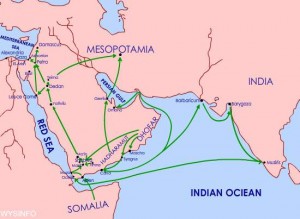Yemen is the present day location of the ancient civilization of Sheba. The kingdom’s fabulous wealth was based on gold mines in Ethiopia. Archeologists have recently discovered what they believe to be the mines of the Queen of Sheba. Furthermore, the story of the Queen of Sheba, who came in procession with great royal gifts of wealth establishes a prophetic precedent. Just as the Queen of Sheba came to bear gifts to the Jewish king Solomon, so it could be that the King of Sheba during Jesus’ time came, like his illustrious ancestor to bear rich gifts to the king of the Jews.
Furthermore, the kings of Yemen during the time of Jesus were Jewish. They would have had a keen interest in the goings on in Herod’s court and the arrival of a new King of the Jews. Finally, Jesus himself mentions this link in Matthew 12:42 when he refers to the Queen of Sheba’s visit to Solomon and referring to himself says, “something greater than Solomon is here.”
There are more intriguing clues based on three gifts. The Arabian peninsula–especially the area of Midian (present day Jordan) and Sheba (present day Yemen) is the only place in the world where the plants grow from which they harvest the resin to make both incense and myrrh. These two rich gifts–used for their aroma and for medicinal purposes were the cash crops of this part of the world.
The origin of the three gifts would indicate that the wise men came from the Arabian peninsula–the Kingdom of the Nabataeans–Biblical Midian and Sheba (present day Yemen). The gifts therefore were not simply rich gifts offered to Christ, but they were symbolic gifts from the kingdoms of their origin. The gifts had diplomatic significance and suggest that the magi were indeed either kings or ambassadors from the court of Nabataea and Sheba.

Even more intriguing–there was constant traffic along the “incense route” which came north from the Southern tip of Arabia up to what is now Jordan and across Judea to Gaza. If the magi were from Southern Arabia and the Kingdom of Nabataea (present day Jordan) their trade route ran right past Jerusalem and Bethlehem.
But were they astrologer priests? While we know there was a sect of astrologer-magicians in Persia it is also true that the Persian wise men were dispersed across the Parthian Empire–which stretched down into the Arabian Peninsula– and beyond. It is also true that the Persian Zoroastrians were not the only astrologers and wise men. The knowledge and wisdom of ancient astrology and prophecy were practiced across the ancient world.
We do not know for certain who the wise men were, and theories and explanations will continue, but if we put all the evidence together it seems that the wise men were probably Zoroastrian influenced astrologers in the court of the Kingdoms of Nabataea and Sheba who brought rich gifts of diplomatic significance to the newborn King of the Jews.
This is an edited version of an article first published in The Catbolic Answer